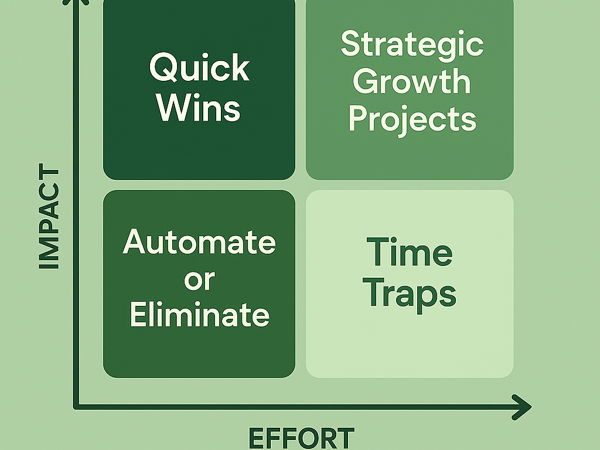
Share this Post
The Power of Delegation: Freeing Up Time to Focus on Growth
The Power of Delegation: Freeing Up Time to Focus on Growth
If you're self-employed or a real estate professional, you're no stranger to long days and full calendars. But not all tasks are created equal—and not all of them deserve your time.
To build a more efficient business, one of the most powerful strategies is delegation. But before you can delegate, you need clarity on what’s actually worth your time. That’s where the Effort-Impact Matrix comes in.
This simple but strategic framework helps you audit your practice and determine where you should focus, what you can delegate, and what you can automate.
The Effort-Impact Matrix: Your Business Audit Tool
Visualize your weekly tasks on a grid with effort on one axis and impact on the other. Then categorize them into these four zones:
High Impact, High Effort: Strategic Growth Projects
These are the big-picture initiatives that move your business forward. They take time, planning, and commitment—but they’re worth every minute.
Examples:
- Designing a referral program
- Building a course or digital product
- Creating long-term marketing strategies
What to do: Schedule these during high-energy times in your week. They belong on your calendar, not your to-do list.
High Impact, Low Effort: Quick Wins
These are small actions with big returns. They're the hidden gems in your business—simple, repeatable tasks that generate value quickly.
Examples:
- Sending thank-you notes to past clients
- Following up on a warm lead
- Sharing a client success story on social media
What to do: Prioritize and systematize. These are your low-hanging fruit.
Low Impact, High Effort: Time Traps
These are the tasks that feel necessary but don’t actually contribute to growth. They’re draining your energy without meaningful return.
Examples:
- Manually organizing emails
- Typing meeting notes after every call
- Formatting spreadsheets
What to do: Delegate or automate these. Every hour you save can be reinvested into higher-value work.
Low Impact, Low Effort: Automate or Eliminate
These are the repetitive, low-stakes tasks that shouldn't require your input at all.
Examples:
- Scheduling social media posts
- Sorting files
- Confirming appointments
What to do: Use automation tools like Calendly, Zapier, or your CRM to handle these behind the scenes.
Turning Insights Into Action
Once you've categorized your tasks, ask yourself:
- What can I delegate to a virtual assistant, transaction coordinator, or part-time hire?
- What can I automate using affordable software?
- What deserves more of my focus—and how can I make time for it?
This kind of audit isn’t just about saving time. It’s about aligning your daily activities with your long-term goals. Your business isn’t just a job—it’s the engine that funds your personal freedom, your family’s future, and the life you’re building outside of work.
By freeing yourself from low-impact tasks, you give yourself more space to focus on the areas where you truly shine. Whether that’s client communication, negotiation, or creative strategy—doubling down on your strengths isn’t just good for efficiency. It’s good for morale, momentum, and results.
Final Thought: Lead Your Business Like a CEO
Delegation is more than a time management tactic. It’s a mindset shift—from being busy to being strategic. Just like a CEO doesn’t manage every detail of their company, you shouldn’t be stuck in the weeds of your business.
The more you focus on the work only you can do—relationship building, client advising, vision casting—the more your business will grow in the direction you want.
So take an hour this week. Use the Effort-Impact Matrix to audit your tasks. Then, make a few small changes that could have a major impact on your time, your energy, and your results.
